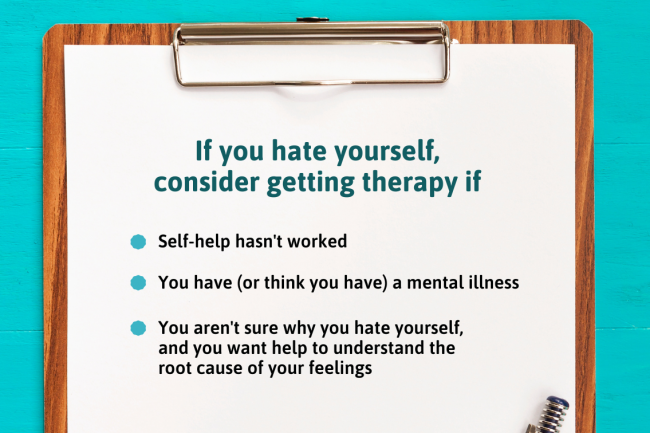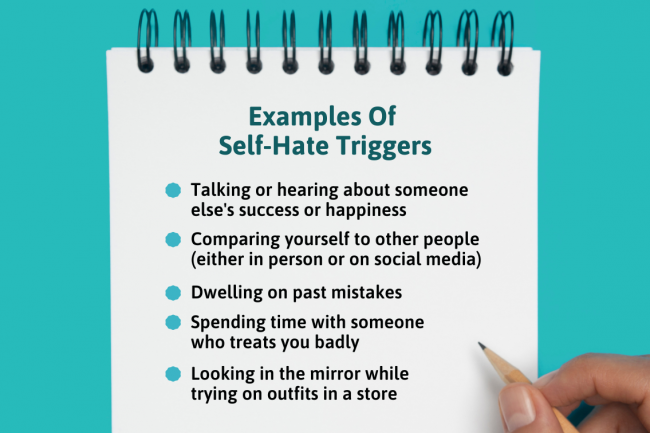Most of us have a few things we’d change about ourselves if we had the opportunity. But some people struggle to name anything they like about themselves. They truly believe they are worth less than everyone else. Their self-hatred causes them significant problems, including low mood, lack of confidence, and even a tendency to sabotage relationships if they don’t feel worthy of friendship or love.
If you’re one of these people, here’s some good news: you can learn to stop hating yourself. In this guide, you’ll learn what causes self-hatred and how to heal from it.
Sections
Reasons why you might hate yourself
Self-hatred has many possible causes. Understanding where your self-hatred has come from can be a great first step toward making positive changes. Here are a few of the most common reasons why someone might hate themselves:
1. Harmful messages from authority figures
Parents, teachers, bosses, and other authority figures can influence your self-image. For example, research shows that teenagers who are criticized and shamed by their parents at an early age are more likely to have a negative inner critic than adolescents who have a healthier relationship with their parents.[1]
2. Toxic relationships
Abusive or toxic relationships can undermine your sense of self-worth and damage your self-esteem, even after they have ended. Abuse is never the victim’s fault, but it’s common for victims to assume that they are in some way defective and to blame for the poor treatment they have received. Self-blame is linked to low self-esteem and shame.[2][3]
3. Mental illness
Self-hatred can be a symptom of mental illness. For example, people with depression often dislike themselves,[4] and negative feelings towards the self are common in borderline personality disorder (BPD).[5] People with other kinds of mental illnesses and disorders may come to dislike or hate themselves because they feel different or alienated from everyone else.
4. Internalized prejudice
Members of minority groups sometimes dislike themselves because they internalize other peoples’ hateful attitudes. For example, gay, lesbian, and bisexual people can internalize homophobia which increases their risk of self-hatred and self-disgust.[6]
5. Unhelpful comparisons
If you frequently compare yourself to other people who appear more successful in some way—for example, people who earn more money than you—you may end up feeling inferior. This can tip into self-dislike or self-hatred.
6. Unrealistically high standards
It’s healthy to set goals for yourself and to have ambitions. But if you tend to set unrealistic goals or hold yourself to extremely high standards, you might spend a lot of time beating yourself up when you inevitably fall short of your own expectations. Over time, you may resent yourself for not being good enough.
7. Unhealthy shame following a mistake
Guilt can be a helpful emotion. It’s a signal that we’ve done something wrong that’s gone against our values, and it can encourage us to learn from our mistakes. But sometimes, guilt can also trigger a feeling that you are a bad person. This feeling of shame can lead to self-hatred.
Ways to stop hating yourself
It’s difficult to stop hating yourself, especially if you’ve felt this way for a long time. Overcoming self-hatred usually requires changing the way you view yourself, changing unhealthy habits, and building better relationships. Here are some strategies and exercises to try.
1. Tackle your negative self-talk
People who hate themselves generally have an unpleasant inner critic who makes unhelpful, hostile remarks that begin with “You.” This voice tends to use negative, dramatic language like “Always” and “Never.” For example, it might tell you, “You always mess up,” “You’re stupid,” or “You never learn from your mistakes.”
If you can learn to speak to yourself in a kinder, gentler way, you may feel more positive towards yourself and life in general. When your inner critic puts you down, try asking yourself:
- Does this thought have any basis in reality?
- What is the evidence against this thought?
- Would I say this to a friend?
- Is there a more helpful way to reframe this situation?
For example, let’s say your inner critic tells you, “Your presentation went terribly. Everyone was bored.”
You could counter that with a more balanced rational thought like, “Some people looked engaged, so it’s not true that everyone was bored. Maybe it wasn’t the most fascinating talk ever, but that’s OK, I did a decent job. If I were talking to a friend, I’d say that they did fine, and one presentation doesn’t matter too much in the grand scheme of things.”
At first, this may feel alien, but it will probably get easier with practice. We have an in-depth guide on how to stop negative self-talk that gives more advice on challenging your inner critic.
2. Keep a journal to identify your triggers
Even if it seems like you hate yourself all the time, there are probably some people, situations, or other types of triggers that make you feel especially bad. Journaling can be a useful tool for identifying your triggers, which is the first step to understanding and handling them.
Over the next few days, pause for a moment whenever you put yourself down or catch yourself saying “I hate myself,” “I’m useless,” or similar. Note down what you were doing immediately before you had those thoughts.
For example, perhaps you feel bad about yourself after your friend told you about their new job, and again the next day when your brother told you about his upcoming promotion. This suggests that other people’s professional success is a major trigger for you.

3. Challenge the thoughts that underlie your triggers
When you’ve identified a trigger, try to work out precisely why it makes you feel bad. You may be able to uncover some unhelpful underlying thoughts or beliefs you hold about yourself. If you can challenge them, you might find that the trigger loses some of its power.
For example, let’s say your feelings of self-hatred pop up when you hear about another person’s career success. On reflection, you might realize that you hold negative assumptions about yourself that affect how you approach your own career, such as “I’m not smart enough to land a good job” or “I’ll never get promoted.”
When you’ve pinned down these assumptions, you can challenge them just as you would any other negative thought. In the example above, you could tell yourself, “Of course, I couldn’t do every type of job, but there’s no logical reason to think I’m incapable of getting a decent position somewhere, even if I don’t know what it will be yet.”
4. Remove your triggers if possible
In some cases, you may be able to simply remove one of your self-hate triggers from your life. For instance, if scrolling through Instagram accounts of influencers makes you hate yourself, try to cut back on the amount of time you spend online.
5. Practice self-compassion
Research suggests that developing self-compassion may help you overcome self-hatred. For example, self-compassion is linked with lower levels of unhealthy perfectionism,[7] and therapies based on self-compassion practices reduce self-criticism.[8]
Self-compassion involves treating yourself with warmth, kindness, and care during difficult times, including those moments when you feel inferior or fail at something important to you. It also entails accepting that no one is perfect and life is sometimes difficult.
There are many practices that may help you cultivate self-compassion, including meditation and expressive writing. Self-compassion expert Kristin Neff’s website contains several exercises you can try. We also have an article on self-love and self-compassion that may be useful.
6. Hang out with positive people
It can be easier to accept or even to like yourself if you surround yourself with kind, positive people who lift you up rather than put you down. A good step toward building a healthier social circle is to learn the signs of a toxic friendship. If your current friends treat you with disrespect, it’s time to meet new people who make you feel positive about yourself.
7. Help others
Research shows that helping other people can improve well-being and self-esteem.[9] Volunteering is an opportunity to make a positive difference. Seeing the results may leave you feeling better about yourself. Search online for local charities and causes, and find one that appeals to you. VolunteerMatch is also a useful resource that can link you to a wide variety of volunteer roles.
8. Overcome unhealthy perfectionism
Perfectionism isn’t always bad. In moderation, it can help you excel. But unhealthy perfectionism, which usually entails obsessing over past mistakes, punishing yourself for failing to hit unrealistic targets, and preoccupation with what other people think of you, can lead to low self-esteem.[10]
Here are some ways you can conquer unhealthy perfectionism:
- Put your mistakes into perspective instead of dwelling on them. It may help to ask yourself, “Will this really matter a week/month/year from now?” If it’s hard for you to keep your mistakes in perspective, ask a trusted friend for their opinion. An outsider’s view can help you see the situation in a more realistic light.
- Learn how to set reasonable goals that are challenging yet realistic. Do not set yourself up for likely failure or excessive stress.
- Watch for unhelpful thoughts or commentary from your inner critic, such as “I have to be the best, or I’m a failure.” Try to find more compassionate, realistic replacements such as “I’d love to be the best, but I’m still a worthwhile person even if I’m not.”
- Ask for help when you need it. Some perfectionists assume they have to do everything themselves and sort out all their own problems, which can be stressful and isolating.
9. Try to accept compliments
It’s not easy to accept compliments when you hate yourself. You might think that the person complimenting you is just being polite. Or perhaps you think they wouldn’t say nice things if they knew the real you and all your flaws. But try not to let compliments go to waste; they can be a good self-esteem boost if you take them on board.
The next time someone compliments you, ask yourself, “Does this person possibly have a point?” You don’t have to accept the compliment completely, but at least try to stay open to the possibility that it contains a grain of truth.
If you find it hard to accept praise from others we have an article on how to accept compliments without feeling awkward.
10. Try to stop making harmful comparisons
If you hate yourself, comparisons become a way of putting yourself down and may fuel your self-hatred.
Here are a few tips to try if you tend to compare yourself to other people:
- Remember that everyone is different. Comparing yourself to someone else isn’t a logical thing to do because you have had different experiences, struggles, opportunities, and setbacks.
- Practice gratitude. Research shows that people who are grateful for the positive things in their lives are less likely to compare themselves unfavorably to others.[11]
- Look for ways someone else’s success could benefit you. For example, if your friend has recently completed a marathon and developed a passion for fitness, they could be the perfect person to help you design a new workout program.
11. Work on releasing past mistakes
Reflecting on your mistakes can help you learn from them. But ruminating about things you wish you hadn’t said or done may keep you locked in self-hatred. You may find yourself thinking destructive thoughts like “I never get anything right!” or “I really messed up, I’m an awful person.”
It may help to learn some constructive strategies for coming to terms with mistakes. For example, some people find it helpful to write about the situation they were in at the time, why they made a bad choice, and what they would do differently in the future.
Our guide on how to let go of past mistakes and embarrassing memories has lots of practical tips that will help you to move on.
12. Seek therapy
If you’ve tried to conquer self-hatred on your own but haven’t made much progress, it may be time to get some professional help. Therapy can be especially valuable if you have (or suspect you have) a mental illness, such as depression or an anxiety disorder.
We recommend BetterHelp for online therapy, since they offer unlimited messaging and a weekly session, and are cheaper than going to a therapist's office.
Their plans start at $64 per week. If you use this link, you get 20% off your first month at BetterHelp + a $50 coupon valid for any SocialSelf course: Click here to learn more about BetterHelp.
(To receive your $50 SocialSelf coupon, sign up with our link. Then, email BetterHelp’s order confirmation to us to receive your personal code. You can use this code for any of our courses.)

13. Realize that self-love benefits other people
Ideally, overcoming your self-hatred should be something you do just for your own benefit, simply because you deserve to like yourself. But if you can’t shake the feeling that self-acceptance is self-indulgent, it may help to realize that if you can change your attitude, the people around you will benefit too.
Consider how you feel when you spend time with someone who seems to be at ease with themselves. Now think about the way you feel after spending time with someone who comes across as negative and self-loathing. Who would you rather hang out with? Self-acceptance has a positive ripple effect. Your family and friends will probably be grateful when you let go of your self-hatred.
Common questions
What are the signs that you hate yourself?
Frequent self-criticism and negative self-talk, low confidence, poor self-esteem, feelings of worthlessness, a tendency to obsess over your past mistakes, and inability to accept compliments are common signs of self-hatred.
Is it normal to hate your life?
It’s normal to hate your life when you are dealing with a tough situation or when you feel stuck in some way. For example, if you are stuck in a toxic relationship, it’s natural to hate your life circumstances. However, hating your life can also signal depression or another mental health problem.

